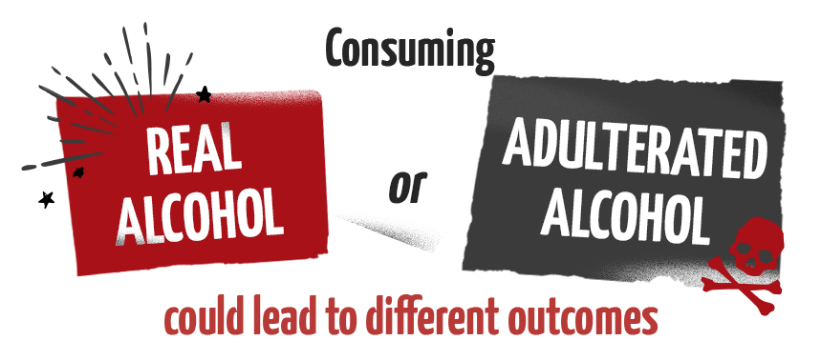How does methanol poisoning happen?
Methanol is found in many everyday items, including household products like paint thinner, laminated sheeting, and vinyl adhesives. It is also used in making fiberboard for desks and shelves. It is tasteless, odorless, and easily absorbed through the skin. Accidental or intentional ingestion, beverage contamination, and irresponsible or unlicensed production of alcohol usually lead to methanol poisoning.
Methanol poisoning is a global problem. Seventy-one (71%) percent of methanol poisoning outbreaks happen in Asia. Over the past two decades, the highest incidents of methanol poisoning have been reported in Southeast Asia, including in Philippines and Indonesia.
The source of methanol poisoning in Indonesia is often local illegally brewed alcohol known as "Arak" – a spirit made from coconut flower, rice, and sugarcane, which can be purchased from unlicensed “bottle-shops”. A common term for this alcohol in Indonesia is “Miras Oplosan” or simply “Oplosan”.
Since 2017, Indonesian media have reported over 200 methanol poisoning cases in the country. But the total number of reported cases of people confirmed with or suspected of methanol poisoning is likely more than 1,100, with more than 700 deaths.
In the Philippines, similar issues arise with locally produced bootleg alcohol, sometimes with a liquor commonly referred to as "lambanog." Another term that is common is "Gin-Bulag" ("bulag" means blind in Filipino), due to the belief that excessive consumption can lead to vision impairment.
Methanol poisoning is difficult to diagnose because it mimics other health issues like asthma, heart problems, sepsis, and diabetic ketoacidosis.
Methanol itself is not toxic, but when the body metabolizes it into formic acid, it becomes harmful. Without ethanol, it takes about 12 to 24 hours for enough formic acid to build up and cause symptoms.
Symptoms of methanol poisoning include rapid breathing and difficulty breathing, blurred vision or blindness, chest pain, and gastrointestinal issues like vomiting or stomach pain. These symptoms can be mistaken for a severe hangover.
Gastrointestinal: abdominal pain, nausea, vomiting, poor appetite, gastrointestinal bleeding, pancreatitis;
Neurological: headache, dizziness, vertigo, amnesia, decreased consciousness, coma, seizure;
Ophthalmologic: visual disturbances, blurred vision, light sensitivity, partial vision loss, dilated pupils, permanent blindness;
Others: respiratory distress or hyperventilation, metabolic acidosis, i.e. increased blood acidity;
Most importantly, patients need an antidote, which can be ethanol (regular alcohol) or fomepizole. Fomepizole is very effective and easy to administer but more expensive. Ethanol works by stopping the metabolism of methanol into its toxic form, acting as a lifesaving medicine rather than a recreational drug. Though effective, it is usually administered in a medical setting to ensure the correct dosage and monitoring.
Other crucial treatments include using a buffer such as bicarbonate solutions to neutralize acidic blood and dialysis to remove toxins if available. Vitamin B metabolite folic acid helps increase the elimination of formate but is not sufficient on its own without an antidote.

Prevention is better than cure: Avoid Illegally Manufactured Alcohol
-
Recognize Legitimate Brands: Purchase alcohol from reputable sources and well-known brands. Legitimate manufacturers adhere to safety regulations and quality control standards.
-
Check for Seals and Labels: Look for proper seals and labels on alcoholic beverages. Legitimate products will have clear, professionally printed labels and secure seals.
-
Be Wary of Unusually Low Prices: Extremely low prices on alcoholic beverages can be a red flag for illegally manufactured alcohol. If a deal seems too good to be true, it probably is.
-
Avoid Homemade or Unlicensed Alcohol: Refrain from consuming alcohol that is homemade or sold by unlicensed vendors. This includes traditional or locally brewed spirits like Arak in Indonesia or Lambanog in the Philippines, which may be produced without proper safety measures.
-
Learn the Signs of Methanol Poisoning: Watch for symptoms like headache, dizziness, nausea, and blurred vision. If you suspect the alcohol you drank is contaminated, seek medical help immediately.
-
Stay Calm and Assess the Situation: Ensure the safety of the environment. Remove the person from exposure to methanol, if possible, without putting yourself at risk.
-
Call Emergency Services: Dial emergency services or your local poison control center immediately. Explain the situation clearly and provide any available information about the source and amount of methanol exposure.
-
Do Not Induce Vomiting: Avoid trying to induce vomiting, as this can cause further harm. Vomiting does not help remove methanol from the body and can lead to additional complications.
-
Provide Fresh Air: If the person has inhaled methanol vapors, move them to an area with fresh air. Ensure they can breathe freely and comfortably.
-
Keep the Person Warm and Comfortable: Help the affected person stay warm and comfortable while waiting for medical help. Avoid giving them anything to eat or drink unless instructed by a healthcare provider.
-
Monitor Vital Signs: Continuously monitor the person’s breathing, pulse, and level of consciousness. Be prepared to provide CPR if the person becomes unresponsive and you are trained to do so.
-
Collect Information: Gather information about the methanol source, the time of exposure, and the quantity involved. This will be useful for medical professionals upon their arrival.
-
Severe Symptoms: Seek urgent medical attention if the person exhibits severe symptoms such as difficulty breathing, chest pain, seizures, loss of consciousness, or severe abdominal pain.
-
Visual Disturbances: Immediate medical help is required if the person experiences blurred vision, seeing spots, or any sudden changes in vision, as methanol poisoning can lead to permanent blindness.
-
Persistent Nausea and Vomiting: Continuous vomiting and severe nausea are signs of significant methanol poisoning and require prompt medical intervention.
-
Confusion and Dizziness: If the person becomes increasingly confused, dizzy, or disoriented, seek medical help immediately. These are signs of severe poisoning affecting the central nervous system.
-
Rapid Heart Rate or Difficulty Breathing: A rapid or irregular heart rate, along with breathing difficulties, indicates a critical condition that needs immediate attention.
-
Contact Poison Control or Emergency Services: Even if symptoms appear mild initially, contact poison control or emergency services for guidance. Methanol poisoning can have delayed and severe effects, and professional medical evaluation is crucial.
By following these steps and seeking prompt medical attention, the risk of severe complications from methanol poisoning can be significantly reduced.

- How much methanol is dangerous?
Even small amounts can be dangerous. As little as 10-30 mL (1-2 tablespoons) can be fatal or cause severe poisoning in adults.
What should I do if I suspect methanol poisoning?
Seek immediate medical help by calling emergency services or going to the nearest hospital. Do not induce vomiting unless instructed by a medical professional.
How is methanol poisoning treated?
Treatment includes administration of antidotes like fomepizole or ethanol, supportive care, and sometimes hemodialysis to remove methanol and its toxic metabolites from the blood.
Can methanol poisoning be detected with a regular alcohol breathalyzer?
No, standard alcohol breathalyzers do not detect methanol. Specific blood tests are required to diagnose methanol poisoning.
- What are the long-term effects of methanol poisoning?
Survivors may experience long-term effects such as vision loss, neurological damage, and kidney failure, depending on the severity of the poisoning and how quickly treatment was administered.
Is methanol poisoning common?
While not common, methanol poisoning can occur in certain situations, such as industrial accidents, improper use of products containing methanol, or consumption of contaminated alcohol.
Can methanol poisoning be mistaken for ethanol intoxication?
Yes, early symptoms can be similar to ethanol intoxication. However, methanol poisoning progresses to severe symptoms such as vision problems and metabolic acidosis, which are not typical of ethanol intoxication.
- How do you support long-term care and recovery?
-
Monitoring and Follow-Up: Patients recovering from methanol poisoning require close monitoring to ensure that all toxic substances have been eliminated from their body and to assess any potential damage.
-
Vision and Neurological Assessments: Since methanol poisoning can cause visual disturbances or blindness, patients may need regular eye exams and neurological assessments to evaluate and manage any long-term effects.
-
Supportive Therapies: Depending on the severity of the poisoning, patients may require various therapies, including physical therapy for motor function recovery or occupational therapy to assist with daily activities.
-
Mental Health Support: The psychological impact of severe poisoning can be significant. Counseling or therapy may be beneficial to help patients cope with the emotional and mental stress resulting from their experience.
-
Preventive Measures: Education on the dangers of methanol and guidance on how to avoid future exposure can be crucial for the patient's long-term safety. This includes information on recognizing and avoiding sources of methanol and the importance of consuming only legally manufactured alcoholic beverages.
-
- Where can you get help?
If you suspect methanol poisoning, contact emergency services or your local poison control center immediately.
Indonesia
Indonesian Poison Information Center (IPIC):
Call centre : +62 85334030409
Ambulance: 119
Supports and awareness group: all Provinces Hospitals and city district hospitals as well as Puskesmas or health centre
Virtual Poison Center of Indonesia is a revolutionary app that uses AI to provide instant assistance in poison-related emergencies. With this centre, users can:
- Instant Interaction: Chat directly with our advanced chatbot via WhatsApp, app, or website.
- Fast, Personalized Help: Get quick answers and solutions for poison emergencies.
- Expert Support: For complex cases, human agents are ready to offer further assistance.
Philippines
National Emergency Hotline: Phone: 911 (nationwide emergency number)
National Poison Management and Control Center:
- 24 HOUR HOTLINE: PLDT: (02)85241078; GLOBE: 09667189904
- Address: Philippine General Hospital, Manila
East Avenue Medical Center (EAMC) - National Poison Management and Control Center:
- Phone: +63 2 8928 0611 (local 233)
- Address: East Avenue, Diliman, Quezon City, Metro Manila
Thailand
Medical Emergency Hotline:
- Phone: 1669 (nationwide emergency number)
Siriraj Hospital Poison Control Center:
- Phone: +66 2 419 7000 ext. 1402
- Address: 2 Wanglang Road, Bangkok Noi, Bangkok 10700
Chulalongkorn Hospital Poison Control Center:
- Phone: +66 2 256 4426
- Address: 1873 Rama IV Road, Pathum Wan, Bangkok 10330
Cambodia
Calmette Hospital
- Phone: 119 (Emergencies – Ambulance, Available 24 hours every day)
- Phone: (855) 23 426 948
- Hotline: (855) 11 426 948
- Address: 34 Preah Monivong Blvd (93), Phnom Penh
Frequently Asked Questions
“There is such huge stigma behind saying it’s just alcohol intoxication. Nobody thinks of the patients as victims. People judge those ingesting illegal drinks, especially in culturally or religiously strict countries. Low awareness and potential social isolation prevents people from seeking medical treatment."
- Dr Chenery Lim, medical doctor who has worked in Southeast Asia to respond to methanol poisoning outbreaks
